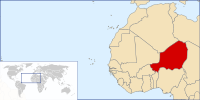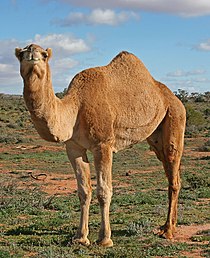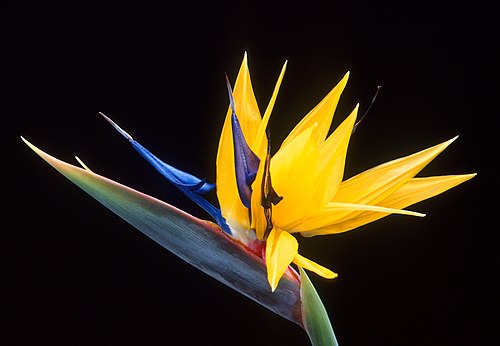Portal:Africa



Africa is the world's second-largest and second-most populous continent after Asia. At about 30.3 million km2 (11.7 million square miles) including adjacent islands, it covers 20% of Earth's land area and 6% of its total surface area. With nearly 1.4 billion people as of 2021, it accounts for about 18% of the world's human population. Africa's population is the youngest among all the continents; the median age in 2012 was 19.7, when the worldwide median age was 30.4. Based on 2024 projections, Africa's population will reach 3.8 billion people by 2099. Africa is the least wealthy inhabited continent per capita and second-least wealthy by total wealth, ahead of Oceania. Scholars have attributed this to different factors including geography, climate, corruption, colonialism, the Cold War, and neocolonialism. Despite this low concentration of wealth, recent economic expansion and a large and young population make Africa an important economic market in the broader global context. Africa has a large quantity of natural resources and food resources, including diamonds, sugar, salt, gold, iron, cobalt, uranium, copper, bauxite, silver, petroleum, natural gas, cocoa beans, and.
Africa straddles the equator and the prime meridian. It is the only continent to stretch from the northern temperate to the southern temperate zones. The majority of the continent and its countries are in the Northern Hemisphere, with a substantial portion and a number of countries in the Southern Hemisphere. Most of the continent lies in the tropics, except for a large part of Western Sahara, Algeria, Libya and Egypt, the northern tip of Mauritania, and the entire territories of Morocco and Tunisia, which in turn are located above the tropic of Cancer, in the northern temperate zone. In the other extreme of the continent, southern Namibia, southern Botswana, great parts of South Africa, the entire territories of Lesotho and Eswatini and the southern tips of Mozambique and Madagascar are located below the tropic of Capricorn, in the southern temperate zone.
Africa is highly biodiverse; it is the continent with the largest number of megafauna species, as it was least affected by the extinction of the Pleistocene megafauna. However, Africa is also heavily affected by a wide range of environmental issues, including desertification, deforestation, water scarcity, and pollution. These entrenched environmental concerns are expected to worsen as climate change impacts Africa. The UN Intergovernmental Panel on Climate Change has identified Africa as the continent most vulnerable to climate change.
The history of Africa is long, complex, and varied, and has often been under-appreciated by the global historical community. In African societies the oral word is revered, and they have generally recorded their history via oral tradition, which has led anthropologists to term them oral civilisations, contrasted with literate civilisations which pride the written word. During the colonial period, oral sources were deprecated by European historians, which gave them the impression Africa had no recorded history. African historiography became organized at the academic level in the mid-20th century, and saw a movement towards utilising oral sources in a multidisciplinary approach, culminating in the General History of Africa, edited by specialists from across the continent. (Full article...)
Selected article –

Climate change in Africa is an increasingly serious threat as Africa is among the most vulnerable continents to the effects of climate change. Some sources even classify Africa as "the most vulnerable continent on Earth". Climate change and climate variability will likely reduce agricultural production, food security and water security. As a result, there will be negative consequences on people's lives and sustainable development in Africa.
Over the coming decades, warming from climate change is expected across almost all the Earth's surface, and global mean rainfall will increase. Currently, Africa is warming faster than the rest of the world on average. Large portions of the continent may become uninhabitable as a result of the rapid effects of climate change, which would have disastrous effects on human health, food security, and poverty. Regional effects on rainfall in the tropics are expected to be much more spatially variable. The direction of change at any one location is often less certain. (Full article...)
Featured pictures –
Did you know (auto-generated) -

- ... that after the 1999 Tempe military base shooting, the Pan African Congress demanded a military funeral for the perpetrator?
- ... that Richard Stratton's diplomatic career took him "from South America to Japan, and from Southern Africa to the foothills of the Himalayas"?
- ... that Albert Luthuli was the first African to win the Nobel Peace Prize?
- ... that Ralph E. Brock was the first academically trained African-American forester in the United States?
- ... that after erecting the African Union headquarters, the Chinese government was accused in 2018 of spying on the building for five years?
- ... that Anderson Stadium in Austin, Texas, is the last high-school football stadium in the state built exclusively for African-American students?
Categories
Selected biography –
Bantu Stephen Biko OMSG (18 December 1946 – 12 September 1977) was a South African anti-apartheid activist. Ideologically an African nationalist and African socialist, he was at the forefront of a grassroots anti-apartheid campaign known as the Black Consciousness Movement during the late 1960s and 1970s. His ideas were articulated in a series of articles published under the pseudonym Frank Talk.
Raised in a poor Xhosa family, Biko grew up in Ginsberg township in the Eastern Cape. In 1966, he began studying medicine at the University of Natal, where he joined the National Union of South African Students (NUSAS). Strongly opposed to the apartheid system of racial segregation and white-minority rule in South Africa, Biko was frustrated that NUSAS and other anti-apartheid groups were dominated by white liberals, rather than by the blacks who were most affected by apartheid. He believed that well-intentioned white liberals failed to comprehend the black experience and often acted in a paternalistic manner. He developed the view that to avoid white domination, black people had to organise independently, and to this end he became a leading figure in the creation of the South African Students' Organisation (SASO) in 1968. Membership was open only to "blacks", a term that Biko used in reference not just to Bantu-speaking Africans but also to Coloureds and Indians. He was careful to keep his movement independent of white liberals, but opposed anti-white hatred and had white friends. The white-minority National Party government were initially supportive, seeing SASO's creation as a victory for apartheid's ethos of racial separatism. (Full article...)
Selected country –
 |
 |
||

| |||
Niger, officially the Republic of Niger, is a landlocked country in Western Africa, named after the Niger River. It borders Nigeria and Benin to the south, Burkina Faso and Mali to the west, Algeria and Libya to the north and Chad to the east. The capital city is Niamey.
At 1,267,000 square kilometres (489,000 sq mi), of which 300 square kilometres (115 sq mi) is water, Niger is the world's twenty-second largest country. Niger has a total of 5,697 kilometres (3,540 mi) of borders, the longest of which is with Nigeria to the south.
Niger's subtropical climate is mainly hot and dry. In the extreme south there is a tropical climate on the edges of the Niger River basin. The terrain is predominantly desert plains and sand dunes, with flat to rolling savannah in the south and hills in the north. The lowest point is the Niger River, with an elevation of 200 metres (722 ft) and the highest is Monts Bagzane at 2,022 metres (6,634 ft). (Read more...)
Selected city –

Port Said (/saɪd/, Egyptian Arabic: بورسعيد, romanized: Bōrsaʿīd, pronounced [boɾsæˈʕiːd, poɾ-]) is a port city that lies in the northeast Egypt extending about 30 km (19 mi) along the coast of the Mediterranean Sea, straddling the west bank of the northern mouth of the Suez Canal. The city is the capital of the Port Said governorate and it forms the majority of the governorate, where its seven districts comprise seven of the governorate's eight regions. At the beginning of 2023 it had a population of 680,375 people.
The city was established in 1859 during the building of the Suez Canal. There are numerous old houses with grand balconies on all floors, giving the city a distinctive look. Port Said's twin city is Port Fuad, which lies on the eastern bank of the Suez Canal. The two cities coexist, to the extent that there is hardly any town centre in Port Fuad. The cities are connected by free ferries running all through the day, and together they form a metropolitan area with over a million residents that extends both on the African and the Asian sides of the Suez Canal. (Full article...)
In the news
- 7 February 2025 – Kivu conflict
- The United Nations and the Democratic Republic of the Congo communications minister Patrick Muyaya recognize that most of the 165 female prisoners of the Goma prison in North Kivu who were raped by escaping male inmates a week ago died in the ensuing fire. (CNN) (The Guardian)
- 7 February 2025 – Somali Civil War
- The Somali National Army, supported by local Ma'awisley clan militias, kills dozens of al-Shabaab insurgents during heavy clashes which erupted after allied forces launch an offensive targeting al-Shabaab stronghold positions in the Jicibow area of Shebelle River, Hiiraan, Somalia. (Hiiraan Online)
- 7 February 2025 – South Africa–United States relations, Racism in South Africa
- U.S. President Donald Trump orders a freeze on all foreign aid to South Africa citing a South African law that allegedly allows land to be forcibly seized from white farmers. Trump also calls for the U.S. to accept Afrikaner refugees to protect them from "government-sponsored race-based discrimination". (NDTV)
- 6 February 2025 – Kivu conflict
- Malawian President Lazarus Chakwera orders Malawian troops to withdraw from peacekeeping operations in the Democratic Republic of the Congo as the crisis escalates. Three Malawian soldiers have been killed in recent fighting in North Kivu. (BBC News)
- 6 February 2025 – Islamist insurgency in the Sahel
- Ten Nigerien soldiers are killed in an ambush by Islamic State fighters near the border with Burkina Faso. (AP)
- 5 February 2025 – War against the Islamic State
- A deadly battle between the Puntland Security Force and Islamic State results in the killing of 57 foreign militants in Dharin area of Bari Region, Puntland. (Garowe Online)
Updated: 21:05, 8 February 2025
General images -
Africa topics
More did you know –

- ...that the 1459 Fra Mauro map (pictured) reports that "a junk from India" rounded the Cape of Good Hope in 1420, around 70 years before the navigations of Vasco da Gama?
- ...that the 1998 Sudan famine was caused by human rights abuses in the midst of the Second Sudanese Civil War?
- ...that a smokie is a West African delicacy made by blowtorching the carcass of a sheep or goat without removing its fleece?
- ...that Anne-Marie Nzié, a Cameroonian bikutsi singer, dedicated the song Liberté to President Paul Biya and his party, the Cameroon People's Democratic Movement?
Related portals
Major Religions in Africa
North Africa
West Africa
Central Africa
East Africa
Southern Africa
Associated Wikimedia
The following Wikimedia Foundation sister projects provide more on this subject:
-
Commons
Free media repository -
Wikibooks
Free textbooks and manuals -
Wikidata
Free knowledge base -
Wikinews
Free-content news -
Wikiquote
Collection of quotations -
Wikisource
Free-content library -
Wikispecies
Directory of species -
Wikiversity
Free learning tools -
Wikivoyage
Free travel guide -
Wiktionary
Dictionary and thesaurus






















































































